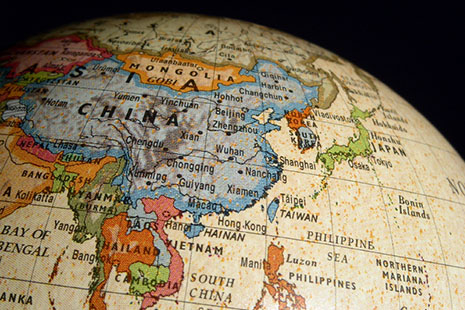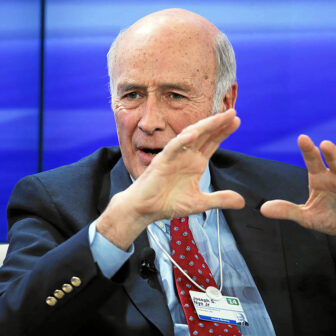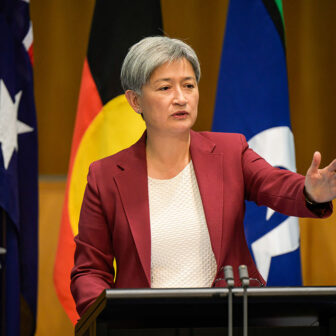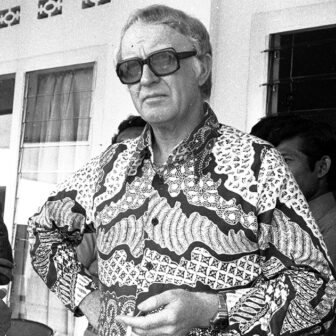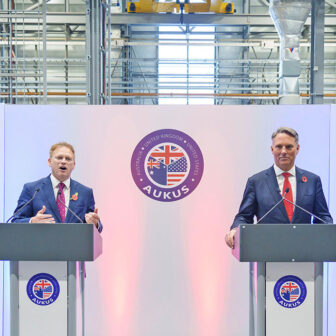THE HISTORIC SHIFTS in global economic and strategic power emerging with the rise of China are now the overriding focus of Australian foreign and defence policy. How Paul Keating sees these shifts is significant because of the role he played in expanding Australia’s engagement with China.
At first glance Keating’s recent speech at John Curtin University in Perth looks like an optimist’s endorsement of an unreserved Australian embrace of China, a nation he says will play “an altogether positive” role in the world and the Asia-Pacific region. He speaks of the “huge opportunity” presented to Australia by China and says that “we must always be outgoing. We must be alert, dexterous and positive: never defensive.”
It is tempting to ask whether Keating is still so sanguine about China following the publication this week of pictures of riot-control troops with fixed bayonets running through the city of Urumqi to stamp out violence between minority Uighurs and Han Chinese. The arrest last Sunday of Australian Rio Tinto mining executive Stern Hu on charges of espionage and theft of state secrets might also have prompted Keating to ponder the opportunity presented by China.
Keating is critical, as others have been, of what he calls “an ambivalent tone” in Australia’s new defence white paper, saying it fails to indicate whether Australia should regard China’s growing military capabilities as natural and legitimate for a rising economic power, or as a threat. What he doesn’t acknowledge is that the white paper, for all its flaws, does call on China to “do more” to reach out to neighbours to explain its military expansion.
For a man impatient with the equivocations, qualifications and fine distinctions that mark much scholarly and diplomatic discussion of foreign and defence policy, Keating reveals his own ambivalence and the contradictions in his own analysis of China’s rise. He acknowledges, for example, that “Australia does not know and cannot divine what sort of new order might obtain as Chinese economic and military power grows in the face of relative American decline.” That would seem to counsel a caution absent from much of his speech.
Keating is also unsure whether the Asia-Pacific region will remain as peaceful and as prosperous as it has been since the end of the Vietnam war. It might or it might not, he says. He speaks of regional developments being “uncertain” and “incapable of prediction.” These uncertainties do not sit easily with Keating’s call on Australia to be always outgoing and never defensive and to see China simply as a huge opportunity.
Perhaps a better conclusion to be drawn from Keating’s characteristically graphic presentation is that Australia should be as open and as outgoing and as accommodating as possible towards China while, at the same time, being as cautious and as defensive as China’s behaviour at home and abroad makes necessary. Engagement with China (or any other country) is not an all-or-nothing proposition; there are always the shades of grey that Keating seems unwilling to acknowledge.
Kevin Rudd understands better than Keating the need for nuance and balance in dealing with China, and even at times moves to achieve it. But Rudd presides over a policy that is too often tentative, nervous, even pusillanimous. It is driven by concerns about the economic consequences of taking positions that might annoy China and a reluctance to insist that Australia has values (including human rights values) that are not disposable when they prove inconvenient.
Rudd should not soft-pedal on these issues. He should tell Beijing plainly that Australia has, in the United States, Japan and South Korea, natural liberal democratic friends and allies. They have no interest in wanting to contain China’s rise but every interest in wanting to see China rise to greatness as a peaceful nation that respects others as it wants to be respected. While China is, as Keating says, a great civilisation and a state with “a profound sense of self,” it is also a brutal communist dictatorship that happens to have embraced market economic policies with spectacular success. In some ways China plays a positive role in world affairs, pursuing its national interests in entirely legitimate ways. It plays, for example, a responsible and even stabilising role in global economic and financial affairs and it is as entitled as any other state to pursue access to mineral and energy resources necessary to fuel its growth – even if its efforts can discomfort Australians.
But other aspects of China are vexing and uncertain. It executes or exiles criminal or merely dissident citizens. It controls the press and censors the internet. Its policies towards Taiwan, Tibet and North Korea reflect the brutal aspects of Chinese communism. Perhaps China’s mindset is not so different from that of any great power – including the United States, which China is poised to overtake as the world’s largest economy in barely a decade. But at least in the United States the government cannot muzzle the media and political dissent and there are legal and constitutional restraints on government power.
One issue rightly identified by Keating – and by the defence white paper of which Keating is critical – is the question of what happens when China’s economic power surpasses that of the United States. Keating says Australia should not “look to position ourselves as a comfortable accessory tucked under someone else’s armpit” – a not-too-subtle reference to Australia’s tendency to look to the American alliance for security. But Keating does not make clear what he thinks should be the future of the US alliance as China outstrips it economically and strategically.
Rudd’s policy for adjusting to what the defence white paper calls “China’s potential to overtake the United States as the world’s largest economy around 2020” seems to be to hope for the best and to hedge against the worst. Rudd seeks to tilt cautiously towards Washington while simultaneously reassuring Beijing and undertaking a multi billion dollar military modernisation program. It is a careful balance but it is not clear how long it will continue to be sustainable policy even if the United States, in decline, remains the preeminent global military power and even if it determines to stay engaged in the Asia-Pacific region.
The problem is that China seems to be probing the boundaries of the Rudd government’s tolerance. Beijing criticised a recent visit by Australian politicians to the Dalai Lama, the Tibetan spiritual leader, claiming it was interference in China’s internal affairs. The politicians met the Dalai Lama in India. It was not the first time Beijing has thrown its weight around accusing Australians of interfering in Chinese affairs when they have met with Tibetan or Taiwanese leaders.
Beijing recently opposed the resettlement in Australia of ten of the seventeen Uighurs released without charge after seven years’ detention at Guantanamo Bay. Australian foreign minister Stephen Smith, demonstrating total spinelessness, evaded the US government’s request that Australia resettle the Uighurs. Eventually, the United States paid the Pacific island of Palau to take the men and Smith did not have to decide whether to risk giving offence to China by admitting them.
Beijing also has a history of detaining or gaoling Australian businessmen who fall foul of local authorities. In 1993 the Australian businessman James Peng was kidnapped from a hotel in Macau and sentenced to eighteen years’ gaol on trumped-up charges. He was released in 1999. Queensland businessman Miles Ellery was held in China for almost a year under an indefinite travel ban following a business dispute.
The fate of Rio Tinto’s Stern Hu remains to be seen. It is unclear whether his arrest was in any way connected to the recent failure of the bid by China’s Chinalco corporation to increase its stake in Rio Tinto and to take minority stakes in Australian projects including Pilbara iron ore operations.
The sticking points don’t end there. Recent reports from China suggest that up to eighty newborn Chinese baby girls from the south-western Guizhou province have been sold for adoption for $US3000 each to foreign adoptive parents. The babies were taken from parents who could not afford to pay a fine of some $US3000 by local officials enforcing the one-child policy. If the Rudd government was affronted by this abuse of human rights, it has managed to stay silent.
Beijing’s economic importance to Australia is beyond question. But China needs Australian minerals and energy as much as Australia needs to sell them. The relationship is therefore more symmetrical than Rudd (or Keating) seems to acknowledge – and we do have powerful friends as well as a growing capability to protect ourselves and regional partners. There is no need for Australia to kowtow as the Middle Kingdom continues its dazzling rise. And it does need to make plain the limits of its tolerance when Beijing starts to throw its weight around. •
